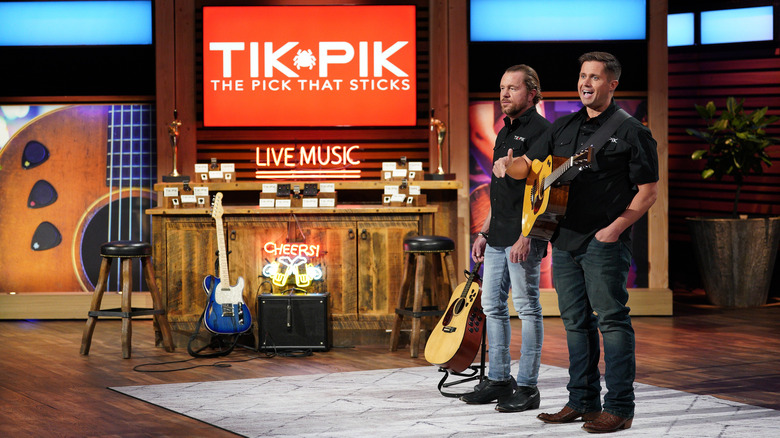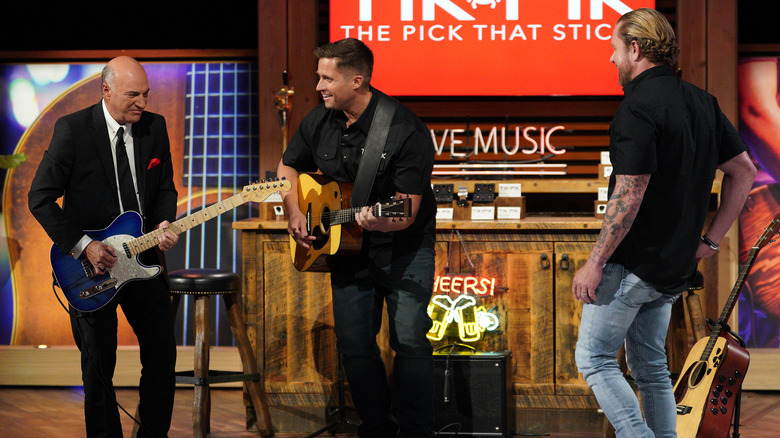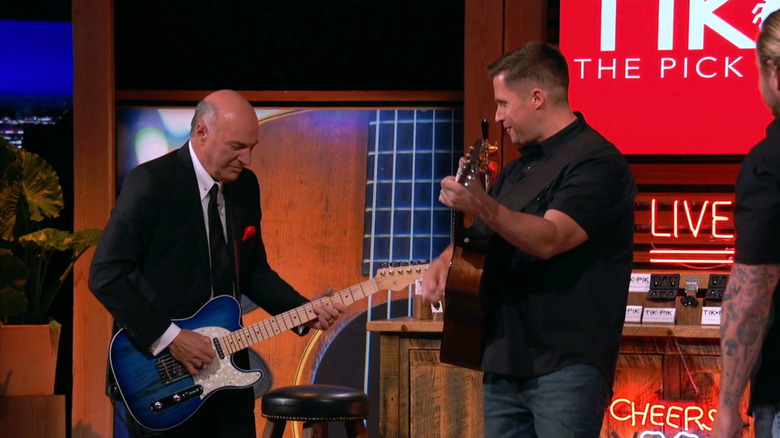What You Need To Know About Tik Pik From Shark Tank
It's a problem that most guitarists have faced: they're gearing up for a big performance or even an important practice session, only to find that their trusty guitar pick has up and vanished. It's a minor issue that can ultimately be chalked up as a fleeting annoyance, but one particular "Shark Tank" company is dead-set on drastically reducing the number of lost picks out there, and they are called Tik Pik.
Set to be featured on "Shark Tank" Season 15, Episode 6, Tik Pik's titular product is a line of guitar picks that can be directly fastened onto guitars so that musicians are less likely to lose them while using their instrument. While Tik Pik's quest to secure a deal with the sharks makes for an entertaining "Shark Tank" installment, some viewers of the series may be interested in this specialized guitar pick based on the concept alone. With that in mind, here are the most important things to know about Tik Pik as a product.
Tik Pik was born in Nashville
Tik Pik as a business is obviously music-focused, but the company has a notable bit of industry heritage in terms of where exactly it began. As it happens, Tik Pik was first born in Nashville, Tennessee. Music buffs know Nashville as something of a musical holy land, with the location being called home by a number of massively famous artists, studios, venues, and locales like the Nashville Country Music Hall of Fame. It makes sense that Tik Pik would originate from there, as the idea for the business was born from the minds of a couple of notable country musicians.
Tik Pik was made by guitar players for guitar players. The idea was originally conceived by artist and Tik Pik COO Kevin MaC and singer/songwriter Jacob Lyda after the pair set out to find a solution to the struggle of constantly losing guitar picks. Since it began, the Tik Pik operation has expanded to include a number of other talents, including CEO Nick Nowak, better known by his stage name Nicholas George, and partners Mike Stalnaker and Nicholas Wolfs.
As for Tik Pik's branding, the product's unique moniker has nothing to do with TikTok or anything of the sort. Rather, it's a stylization of the phrase "tick pick," likening the pick's unique sticking ability to that of the clingy outdoor arachnid. That's also why Tik Pik's logo looks like a cross between a guitar pick and something one might see on Spider-Man's suit.
Professional musicians swear by Tik Pik
Tik Pik sounds like a novel concept, but interested consumers may wonder whether the product has been proven to be worthwhile for those who have already opted in. Fortunately, Tik Pik has amassed a number of glowing recommendations from users, including several from professional musicians.
The Tik Pik website features testimonials from some of the company's most high-profile clients, and they have pretty positive things to say across the board. Grammy award-winning songwriter Brent Maher spoke highly of the product. "Tik Piks have me hooked on playing with a pick again, the guitar sounds better and I sound better," he said. "I think they are a brilliant idea, and I really love them!"
A few individuals, such as popular country musician Craig Campbell, particularly emphasized the comfortability of using Tik Piks, as the specialized picks featured a softened design and three width variations for comfort and ease of use. "I love the Tik Pik! Not only are they super practical, they are comfortable between my fingertips," Campbell said. "Now when I drop a pick on stage, I have no worries because there will always be a Tik Pik right there waiting!"
Tik Pik uses specialized suction technology
Tik Piks may look relatively simple, but there's quite a bit going on with the technology that allows them to do their job of sticking firmly to a customer's guitar. In terms of the actual adhesive that gives Tik Piks their trademark sticky quality, each pick features a circle filled with thousands of miniature suction cups. This "nano-suction" allows the picks to stay firmly on their attached surface, while also ensuring that the picks don't damage a guitar when placed or removed, as other adhesive materials might.
Tik Pik's suction cup solution also improves the longevity of each singular pick. Unlike other sticky substances which can wear off over time or with excessive use, Tik Piks can be washed and cleaned without any worries about ruining the adhesive. That means that a single set of Tik Piks can be reused, with no need to keep replacing them later down the line. "We want you to pay for these and hold onto them and love the product you're pulling out of your guitar case and know that it's going to last you for a long time," Kevin MaC said in an explanatory video on the Tik Pik site.
What happened to Tik Pik on Shark Tank?
Nick Nowack and Kevin MaC enter the "Shark Tank" seeking $75,000 in exchange for 10% of the company. The duo are just two-fifths of the Tik Pik quintet, but they're hoping for at least one more band member to help the product find space in big-name stores like Guitar Center. After a pitch that was about as lively as you'd expect from two seasoned musicians — three, if you count Kevin O'Leary absolutely crushing a blues riff out of nowhere — the panel digs into the numbers behind that $750,000 valuation.
In just over eight months, Tik Pik has sold $60,000 worth of product. This year, the entrepreneurs project $120,000 in sales and up to $20,000 in profit. There is some concern among the sharks that the $29.95-per-six-pack price makes the Tik Pik an alienating premium product, but MaC reports that beginner guitar players are some of their best customers (enjoying the ease of use provided by the grip). As for its functionality for experienced players, O'Leary attests that using the Tik Pik felt completely normal.
Lori Greiner seemingly begins to kick off the negotiating process but before she can either make an offer or go out, Mark Cuban interrupts her. He offers Tik Pik $75,000 in exchange for 16% and then begins to count down from five once they start fielding other offers. Under pressure, the pair accepts the deal and leave the tank singing a happy tune.




